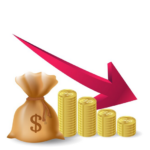Financial markets stay edgy as investors assess the economic repercussions of President Donald Trump’s contradictory tariff strategies. Thursday was a timeout of sorts after adjustments to the President’s global tariff plans lasted just a bit too long. Trade-related caution in action to the shifting trade dialogues between the US and China is another major import factor for the US. Meanwhile, the President’s decision to set tariffs on other nations 90 days in advance showed that the fog Schoenfeld would not cover tariffs.
Market Activities and Investors’ Sentiments
On Thursday, the benchmark fell 3.5% after the S&P500 plunged more than 6% during the session, following a significant rally. That came on the heels of a 9.5% advance in the index – its most significant one-day gain since the global financial crisis in October 2008. That makes the index 14.3% under its Feb. 19 peak. Market volatility is back on the rack. The situation turns back to market volatility, which reared its head once again on Thursday, with the CBOE Volatility Index spiking to a level near 55 points, more than three times above the long-run median level. The CBOE Volatility Index — known as the “fear gauge” of Wall Street — was hovering around one of its highest levels for five years ago at the onset of the COVID-19 pandemic.
Economic Concerns Persist
The harshest trade measures have ceased, at least for now, but investors remain jittery concerning their economic implications. Suppose trade policy becomes less of a contractionary force on the economy. In that case, it will only push the end of the economic activity contraction out to later in the year, analysts at JPMorgan said. Moreover, forgoing a baseline 10% tariff is interpreted as a non-starter unless significant other tariffs (such as on cars) are imposed.
Various Experts and Risks
A Janus Henderson strategic analyst called on investors to cut equities and boost investment-grade sovereign bonds. The risk of recession has skyrocketed in recent weeks, the expert said, as tariffs could threaten already anaemic global economic growth.
An Unforgiving Hit, A Corporate Mindset
Investors are betting that executives won’t shed much light on their outlooks amid the haze of the trade climate as companies begin to release quarterly results in the coming days. Analysts will find any further specificity that companies provide about their supply chains and future investments especially valuable, given how broad the tariffs are. Yet one could see less-than-expected earnings reports, which could present a risk to stock, especially now that corporations will have to contend with a new trade regulation.






